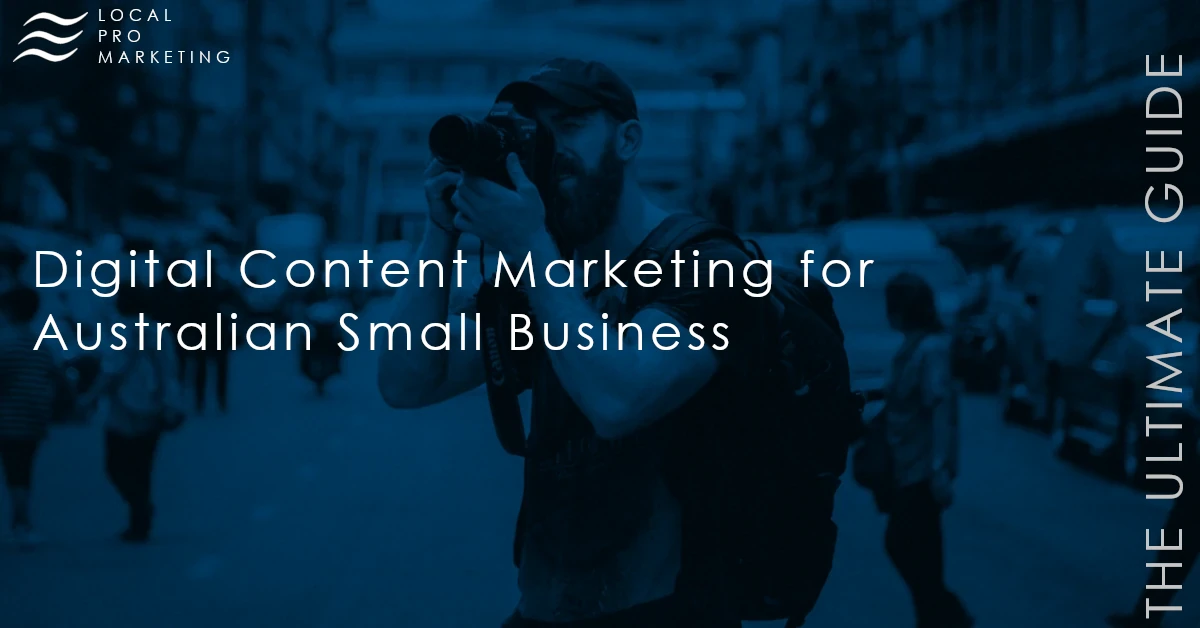
Having a strong online presence is crucial for success. But with so many options and platforms available, it can be overwhelming to decide how to market your business effectively online. One of the most effective and versatile approaches to online marketing is digital content marketing.
Digital content marketing involves creating and distributing valuable, relevant, and consistent content online to attract and engage a clearly defined audience. The content can take various forms, such as blog posts, videos, infographics, social media posts, podcasts, e-books, newsletters, and more. The goal of digital content marketing is not to directly promote your products or services, but to provide useful information, entertainment, or inspiration that builds trust, credibility, and loyalty with your audience.
The benefits of digital content marketing are numerous and significant for small business owners. First, it helps you stand out from your competitors and establish yourself as an authority or thought leader in your industry or niche. By consistently creating high-quality content that addresses your audience’s pain points, questions, or interests, you can differentiate yourself from those who only sell or advertise their products or services. This can lead to increased visibility, awareness, and brand recognition, which can translate into more website traffic, leads, sales, and referrals.
Digital content marketing allows you to target specific segments of your audience more effectively. By knowing your audience’s demographics, preferences, behavior, and needs, you can tailor your content to their interests and preferences, and deliver it through the channels they use the most. This can increase the relevance, engagement, and conversion rates of your content, as well as reduce the waste of resources and efforts on ineffective or irrelevant marketing activities.
Digital content marketing offers a cost-effective and measurable way to reach and engage your audience online. Compared to traditional advertising methods, such as TV, radio, print, or billboards, digital content marketing is often more affordable, flexible, and trackable. You can create and distribute content using free or low-cost tools, such as WordPress, Canva, Hootsuite, or Mailchimp, and monitor your performance using analytics, such as Google Analytics, social media insights, or email marketing metrics. This can help you optimize your content strategy and tactics based on data and feedback, and improve your ROI over time.

What is Digital Content Marketing?
To better understand digital content marketing, let’s break down its key components:
Valuable content
Digital content marketing requires you to create content that is valuable to your audience. This means providing them with information, entertainment, or inspiration that meets their needs, interests, or goals. The content should not be overly promotional or salesy, but rather educational, informative, or entertaining. By providing value to your audience, you build trust, credibility, and loyalty with them, and position your business as a reliable and helpful resource.
Relevant audience
Digital content marketing also requires you to identify and target a relevant audience for your content. This means understanding who your ideal customers or clients are, what they care about, where they hang out online, and how they consume and share content. By defining your audience persona, you can tailor your content to their preferences and needs, and ensure that it resonates with them. This can also help you reach new audiences through social media, search engines, or referrals.
Consistent distribution
Digital content marketing also requires you to distribute your content consistently and strategically. This means selecting the right channels and formats to reach your audience, and creating a content calendar that outlines the topics, formats, and timelines for your content. By being consistent with your content distribution, you can build momentum, increase engagement, and establish a recognizable brand voice and style.
Measurable goals
Digital content marketing also requires you to set measurable goals for your content. This means defining what you want your content to achieve, such as increasing website traffic, generating leads, boosting sales, or improving customer satisfaction. By setting goals, you can measure your performance, track your progress, and optimize your content strategy and tactics based on data and feedback.
Examples of digital content marketing include:
- A blog post that explains how to solve a common problem your audience faces
- A video tutorial that demonstrates how to use your product or service
- An infographic that summarizes the benefits of your industry or niche
- A social media post that asks a question or sparks a conversation with your audience
- A podcast episode that features an expert guest who shares insights or tips
- An e-book that provides in-depth knowledge or research on a topic your audience cares about
- A newsletter that updates your subscribers on your latest news, events, or promotions.

Why Digital Content Marketing Matters for Small Business Owners
Digital content marketing is especially important for small business owners for several reasons:
Limited resources
Small business owners often have limited resources, such as time, money, and staff, to invest in marketing. Digital content marketing can help them stretch their resources by focusing on creating high-quality content that can attract and retain customers over time. By creating content that is relevant, valuable, and shareable, small business owners can leverage their expertise and passion to build a loyal audience that can spread the word about their business.
Level playing field
Digital content marketing also allows small business owners to compete with larger companies on a level playing field. By creating content that is authentic, personalized, and engaging, small business owners can differentiate themselves from their competitors and build a strong brand identity that resonates with their audience. They can also leverage their local or niche knowledge to create content that is hyper-targeted and relevant to their audience, and use social media or email marketing to reach their audience at a lower cost.
Increased engagement
Digital content marketing also enables small business owners to engage with their audience in meaningful ways. By providing value to their audience through informative or entertaining content, small business owners can foster a sense of community, trust, and loyalty with their audience. They can also use interactive or user-generated content, such as polls, quizzes, or testimonials, to encourage their audience to participate and share their thoughts or experiences.
Data-driven insights
Digital content marketing also provides small business owners with data-driven insights that can inform their marketing decisions. By tracking their content performance using analytics, small business owners can see which topics, formats, or channels resonate with their audience the most, and adjust their content strategy accordingly. They can also use A/B testing, heat maps, or surveys to gather feedback from their audience and optimize their website or landing pages for conversion.
Digital content marketing is a powerful and versatile approach to online marketing that can help small business owners succeed in today’s digital landscape. By creating and distributing valuable, relevant, and consistent content online, small business owners can attract and engage their audience, build trust and credibility, and ultimately, drive more traffic, leads, and sales to their business.

Tips and Best Practices for Digital Content Marketing for Small Business Owners
If you’re a small business owner who wants to get started with digital content marketing, here are some tips and best practices to keep in mind:
Define your audience persona
Before creating any content, take the time to define your audience persona. This means understanding your ideal customers or clients’ demographics, psychographics, behaviors, goals, pain points, and preferences. You can use tools such as surveys, social media analytics, or customer interviews to gather insights about your audience. By defining your audience persona, you can tailor your content to their needs, interests, and preferences, and ensure that it resonates with them.
Set measurable goals
Define what you want your content to achieve, such as increasing website traffic, generating leads, boosting sales, or improving customer satisfaction. By setting measurable goals, you can track your progress and optimize your content strategy based on data and feedback.
Create valuable content
Focus on creating content that is valuable to your audience. This means providing them with information, entertainment, or inspiration that meets their needs, interests, or goals. The content should not be overly promotional or salesy, but rather educational, informative, or entertaining. Use different formats and channels, such as blog posts, videos, infographics, social media, or email, to reach your audience where they are.
Consistently publish and distribute your content
Be consistent with your content publishing and distribution. Create a content calendar that outlines the topics, formats, and timelines for your content, and stick to it. Use social media, email marketing, or other channels to distribute your content to your audience, and track your performance using analytics.
Optimize your content for search engines
Use search engine optimization (SEO) techniques to make your content more discoverable and accessible to your audience. Use relevant keywords, meta descriptions, tags, and headers to optimize your content for search engines. Use internal and external links to boost your credibility and authority.
Engage with your audience
Encourage your audience to engage with your content by commenting, sharing, liking, or subscribing to your channels. Respond to their comments and feedback, and use user-generated content to showcase their experiences and opinions.
Measure and adjust your content strategy
Use analytics and feedback to measure your content performance, and adjust your content strategy and tactics accordingly. Test different formats, topics, or channels to see what works best for your audience, and optimize your website or landing pages for conversion.
Digital content marketing is a powerful and effective approach to online marketing that can help small business owners attract and engage their audience, build trust and credibility, and ultimately, drive more traffic, leads, and sales to their business. By following these tips and best practices, small business owners can create and distribute high-quality content that resonates with their audience and achieves their marketing goals.

Digital content marketing is a vital aspect of modern marketing that small business owners cannot afford to ignore. By creating and sharing valuable content that resonates with their target audience, small business owners can build trust, credibility, and loyalty with their customers while also driving traffic, leads, and sales to their business.
Creating and executing a successful digital content marketing strategy takes time, effort, and resources. Small business owners must be willing to invest in quality content creation, distribution, and optimization to achieve their marketing goals.
By following the tips and best practices, small business owners can create a digital content marketing strategy that works for their unique business needs and goals. Remember to define your audience persona, set measurable goals, create valuable content, consistently publish and distribute your content, optimize for search engines, engage with your audience, and measure and adjust your content strategy regularly.
Digital content marketing is a dynamic and evolving field that requires continuous learning, experimentation, and adaptation. By staying up-to-date with the latest trends and best practices and being open to feedback and collaboration, small business owners can leverage the power of digital content marketing to achieve long-term success and growth.
Thanks for taking the time to read this blog post on Content Marketing. Our team at Local Pro Marketing is committed to providing valuable insights and strategies to help businesses succeed in the ever-evolving world of content marketing. We hope you found this post helpful and informative. Don’t hesitate to reach out to us if you have any questions or leave a comment.









